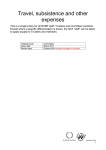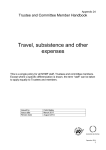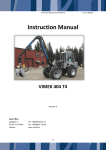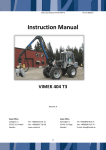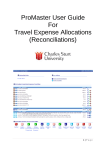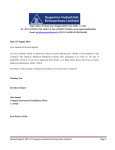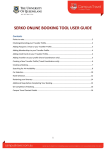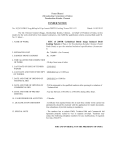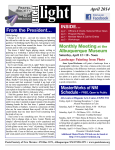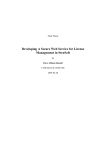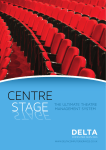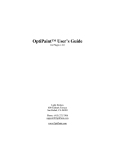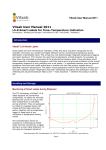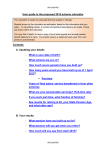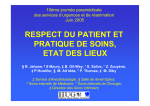Download Appendix 24: Travel and subsistence (PDF
Transcript
Trustee and Members’ Handbook
Appendix 24
TRAVEL, SUBSISTENCE AND OTHER EXPENSES
Author: Steve Willis
Issue Date: March 2011
Review Date: March 2012
1
General principles
1. NHMF will meet the cost of travel and subsistence by Trustees, committee members, expert
panellists and its staff on official business.
2. Costs re-imbursed must be wholly, exclusively, necessarily and actually incurred on NHMF
business.
3. In order to obtain the best value for money, journeys must be arranged as economically as
possible. You should use the most efficient and economical means of travel, taking into
account the cost of travel and subsistence. NHMF will refuse to meet any expenses that are
considered unreasonable or which could have been avoided had the journey been better
planned.
4.
„Official travel‟ means travel for the purpose of official business, not travel between your home
and your normal office base. Trustees and committee members who are re-imbursed their
expenses when travelling from home to their normal office base must make this clear on their
official claim form. If you come to the office on days that are not your normal working day
(perhaps because you work part-time or for week-end work) you are not entitled to claim the
cost of travel to and from the office.
5. Claims will only be met within the limits set out in this chapter of the Staff Handbook and on the
production of valid receipts. Without a receipt, we cannot meet your claim. You may spend
what you wish but must limit your claim to the limits herein. Hotel costs invoiced directly to us
are treated as part of your expense claim.
6. On the basis of the rules set out in these guidelines Inland Revenue has granted NHMF a
dispensation - expenses reimbursed within these limits will be free of tax liability and need not
be reported on form P11D. Therefore, expenses re-imbursed in line with these rules need not
be incorporated on your tax return.
7. Hotel accommodation should normally be booked through Expotel (see annex 3 for details)
unless you can demonstrate that it would be more cost-effective to use another company. .
8. Reimbursement for expenditure incurred should be claimed either via petty cash at the time or
by monthly completion of an NHMF expenses‟ claim forms. Claims will not be accepted if the
expense forms are not properly completed, are illegible or contain correction fluid. Claims not
accepted will be sent to the authorising officer for corrective action. Reimbursement for
expenditure of £50 or less should be done using a petty cash voucher to reduce the workload
for everyone.
9. All claims should be made within 3 months, and must be made within 6 months. Any claim for
expenses incurred more than 6 months before the claim is submitted will not be processed.
10. Authorisation of an expense claim indicates that the authorising officer is personally satisfied
that the claim meets, in all respects, the requirements of these rules. Claim authorisation must
comply with Authorisation Schedules 1 and 2 located on the Intranet (Document Library,
Finance, Manuals and Forms, Manuals and Documents).
11. For the sake of simplicity, the term „staff‟ is used throughout these guidelines but the
arrangements set out below apply equally to Trustees, committee members and panellists.
12. You cannot claim for a journey or part of a journey covered by a season ticket held for your
private use.
2
13. It is normally cheaper to buy your own travel ticket than go via a travel agency. Those of you
without credit cards should apply for a Government Procurement Card.
14. We are required to report carbon emissions generated through our business travel. We have
arranged that our principal rail and air travel supplier (Redfern) and our principal hire car
supplier (Enterprise (ARMS) see annex 4) will automatically provide this information. If you use
other sources for your travel you are responsible for recording and calculating emissions.
There is a separate procedure for this.
Non-NHMF staff expenses
15. Advisers and other suppliers will be re-imbursed at rates agreed between those people and the
purchasing department and fall outside the remit of this document. The principle should always
be that the supplier‟s expenses are deemed to be “reasonable” by the person authorising the
expenditure. NHMF staff should refuse to approve invoices containing expenses that are
considered unreasonable or which could have been avoided had the journey been better
planned.
Rail travel
16. Any requirement for travel by train should normally be booked via the on-line service provided
by Redfern. See annex 5 for more information.
17. In the interests of economy, everyone should purchase the cheapest possible ticket. Buy
„advance‟ train tickets as early as possible for as many train journeys as possible. All staff may
travel 1st class if that is the cheapest „advance‟ ticket available, which is sometimes the case if
all standard „advance‟ tickets have been sold; no one has an entitlement to first class travel.
18. Anytime standard tickets should be purchased only where there are legitimate business
reasons as they are more expensive than „advance‟ tickets. No one should ever buy a 1st
class „anytime‟ rail ticket.
19. If you have to travel overnight on official business, you are entitled to a single sleeping berth.
20. When claiming for rail fares for which you have paid, you must attach the ticket to the claim or
give the ticket number, date of issue and the office or station where the ticket was issued, or
your claim will not be met. The only exceptions are tickets issued by transport systems which
routinely retain the ticket at the end of the journey or where payment has been made by the
use of a prepayment card such as Oyster.
Sea travel
21. If you travel overnight, you are entitled to a single sleeping berth.
Air travel
22. Air travel within the UK should be used only when:
There is no practical alternative;
there is a cost advantage;
the urgency of the journey justifies the extra cost;
3
23. Economy travel should be used at all times. Should economy class seats not be available,
and circumstances prevent other flights from being an option, business class tickets may be
purchased with the prior written approval of the Director of Finance & Corporate Services.
24. You may not make personal use of any air miles accumulated on official travel.
Self-drive hire car
25. NHMF has signed up to the Home Office Car Hire Framework. The preferred supplier for car
rentals is Enterprise Rent-a-Car (ARMS). Annex 4 contains more detail. Staff can use other
suppliers as long as their hire rates are no more expensive than those offered by Enterprise
(ARMS).
26. Self-drive hire cars must be refuelled before return whenever possible in order to avoid the
refuelling charges of hire companies which are invariably exorbitant. You must hire a car from
the cheapest class available. You will be reimbursed for expenditure on petrol on production of
receipts.
27. You may not claim any mileage allowance if using a self-drive hire car.
28. Staff should not take out any additional insurance when hiring a car. It is central Government
policy that NDPBs be self-insuring. The rates quoted for Enterprise contain the legal insurance
requirement. If using a different hire car company, you should ensure that your car hire day
rate includes that insurance required by law.
Private car and Motor mileage allowance
29. Motor mileage allowance is paid for the use of your own car at 45p per mile no matter the
length of the journey or the engine capacity of your car.
30. Mileage to be claimed is the lesser of:
The distance from home to the site being visited
The distance from your home office to the site being visited
31. For the purpose of payment of motor mileage allowance, the following may be regarded as
your private vehicle:
a vehicle owned or being bought on credit, registered in your name;
a vehicle hired by you in a private capacity (i.e. not hired through Uniglobe or Chartwell);
a vehicle registered in your spouse‟s name or partner‟s name,
and provided that:
-
the insurance policy specifically covers the use of the vehicle by you on the business
of the NHMF and the carrying of business passengers;
-
the vehicle is available for use by you on official business and to carry official
passengers.
32. If you do not have access to a vehicle meeting these requirements you should use public
transport or hire a car.
4
33. You are required to follow the requirements of NHMF‟s “Driving Safely For Work” policy which
is part of the Staff Handbook.
Insurance requirements for motor vehicles
34. To use your own car on NHMF business, you must satisfy certain insurance conditions. It is
your personal responsibility to fulfil these conditions. The requirements are:
your insurance must cover business use by you. If it does not, you cannot claim any
motor mileage allowance;
you must undertake not to seek recovery from the NHMF of any excess you have to pay as
a result of an insurance claim;
if you carry NHMF equipment (e.g. a laptop computer) you must ensure that this does not
affect your cover;
your insurance must fully indemnify the NHMF for any claims made against it as your
employer;
your insurance must include an undertaking that mileage allowance is not seen as a
payment for hire or reward;
your insurance must cover the carriage of business passengers.
35. In the event of any accident, damage, injury or death, no liability will be accepted by the NHMF
beyond that which would have existed if a private motor vehicle wasn‟t being used.
36. You must declare on the expenses claim form that you know and understand the insurance
requirements, and that you are covered accordingly.
Statutory cover against injury
37. Staff are deemed to be „in the course of their duty‟ for the purpose of the injury benefit
provisions of the PCSPS when using a private motor vehicle on official business or when
travelling as an official passenger in another member of staff‟s car. They are also covered by
the Social Security Act 1975, subject to the decision of the Statutory Authorities in a particular
case. In other respects, provision for injury or death due to accident while using your private
motor vehicle on official business is your own responsibility.
Disabled drivers
38. If you are disabled and cannot use public transport you are entitled to claim motor mileage
allowance at the standard rate for all official journeys provided that you have comprehensive
insurance including those requirements outlined above.
Disruption of public transport
39. If you normally use public transport, but have to travel to work in your car during strikes or
industrial action, you may claim motor mileage rate. NHMF will not pay for parking in central
London (except for Trustees)
5
Parking fees, tolls and ferry charges
40. If you use your own or a self-drive hire car, you may be reimbursed the reasonable cost of
parking fees, tolls and ferry charges, except for parking in central London (Trustees and
Committee Members excepted). The definition of “reasonable” excludes parking fees where the
cost of the fees plus mileage rate exceeds the likely cost of public transport to the same
location. You will not be reimbursed for any parking fines incurred. Certain tolls and parking
machines may not allow for the generation of a receipt. These claims will be met if full details
are provided and the amount deemed reasonable.
Travel by taxi
41. Taxis should be used only:
where suitable public transport is not readily available - which is rarely likely to be the case
in London;
where the urgency of the journey outweighs the extra cost;
where you are carrying heavy or bulky items on official travel;
where personal safety could be an issue;
42. The cost of taxis to and from home and office will not normally be reimbursed
Tips
43. Tips to taxi drivers and restaurant staff should be recorded on the receipt.
General principles - subsistence
44. Subsistence limits are not designed to cover 100% of the cost of an absence from the office.
Staff would have incurred costs eating at home or at the office. Subsistence is designed to
cover the additional and necessary costs of being away from the office.
Day Allowance
45. You may claim Day Allowance when you necessarily incur additional expenditure on
subsistence during an absence from the office that does not involve an overnight stay. The
absence from the office must be at least 5 hours in order to qualify. There are two bands, for
five hours and over and 10 hours and over (see annex 1).
46. Claims that are submitted without timings cannot be paid. The time to be recorded is the time
of departure from the office and the time of returning to the office. If you did not depart from the
office, then the duration of your visit is the time taken to make the trip less the time it takes you
to get to the office from home. A similar rule applies if you go straight home after your visit.
47. For example, it takes you an hour to get to the office in the morning from home and another
hour in the evening to get home. If you go on a visit straight from home, leaving at 8am and
arriving back home at 6pm, then your claimable journey time was 10 hours (6pm less 8am) less
your normal journey times of one hour to work and one hour to home; i.e. 8 hours.
6
48. In addition to the day allowance, you can claim for reasonable tea/coffee/water expenses if
these are not provided by your host or you require a long journey by public transport to reach
your destination. Drinks other than tea/coffee/water will not be reclaimable. You do not need to
be away from the office for 5 hours to claim this additional allowance.
Meals on board trains, boats and in airports
49. If you have subsistence on board a train, boat or at an airport you can exceed the relevant
maximum limit by up to 50%. This additional percentage only applies to the proportion of your
claim that relates to the travel by train, boat or airport.
Overnight Expenses
50. The rates in annex 1 apply to the cost of an evening meal and bed and breakfast. No more
than £25 may be claimed for the main evening meal (including drinks). All invoices received by
the NHMF from hotels are to be within these limits. All hotel costs will be considered as the
responsibility of the occupant of the room.
51. If the absence covers lunch time and the host does not provide lunch, you may claim up to £5
for each lunch time absent in addition to the overnight expense.
52. Staff should be aware of the price of the hotel before making their journey. Should it not prove
possible to obtain hotel accommodation within the limits set out in annex 1, staff should obtain
written permission from either the Director of Finance & Corporate Services or the Head of
Finance in advance of the visit. A copy of this permission should be attached to the expense
claim.
Personal Expenses Allowance
53. In addition to the overnight expense allowance, you can also claim a Personal Expenses
Allowance for such items as telephone calls, daily newspapers (not magazines) and stationery
should you be away overnight. All such costs must be receipted. See annex 1 for the rate.
Home telephone calls
54. Staff working from home cannot reclaim the cost of voice calls made on their own equipment.
NHMF mobile „phones should be used if staff must work from home. Staff must not make any
personal calls from NHMF‟s mobile „phones.
55. Staff working from home on a computer connected to NHMF‟s IT network may reclaim the cost
of data transmissions via their own land line. An itemised bill identifying separately the cost of
calls to NHMF‟s e-mail server (0207 730 1626) should be presented in support of the claim.
Working meals
56. When staff are required to have a business meeting at a meal time and at least one member of
that meeting is able to claim the cost of that meal under these guidelines, the other staff may
claim similarly for that meal. Therefore each participant is allowed to claim the same as
whoever is allowed the most (within these guidelines) with limits of £5 for lunch and £25 for
dinner.
Hospitality
57. Staff will not be reimbursed for ineligible hospitality. It is staff‟s responsibility to know what is
eligible and what is not – see section 10 of the Staff Handbook.
7
58. Unless you are giving hospitality, and you meet the eligibility criteria set out in section 10 of the
Staff Handbook, you should not pay for the subsistence costs of a supplier. In other words, if
you are on the same visit as an adviser, you should not pay for their drinks or meals.
Overspending your allowance
59. If you claim for more than you are entitled, the authorising officer must reject the claim. If the
NHMF is paying a supplier directly, you will be charged for any portion of that bill in excess of
your entitlement. Finance will normally set this charge off against future expense claims.
However, Finance has the right to demand immediate re-imbursement and, until repaid, you
should not make any petty cash claims.
Weekend work
60. Where individuals are, of necessity, required to work at the office at weekends, they are
entitled to make subsistence claims in line with the limits in annex 1; i.e. if you're in the office
for five or more hours you can claim up to £5. Travel costs will not be re-imbursed.
8
Annex 1
MOTOR MILEAGE ALLOWANCE RATES (for use of own car when insurance conditions are met)
Standard Rate for cars is £0.45 per mile.
Motorbikes £0.24 per mile.
SUBSISTENCE RATES
Day Allowance
0 - <5 hours
£0.00
5 hours and over
£5.00
10 hours and over
£10.50
Overnight allowance (includes cost of bed and breakfast but not Personal Expenses Allowance of
£3.50)
Outside London
£115
Within London
£135
Within the above limits no more than £25 may be claimed for a dinner and no more than £5
for a lunch.
9
Annex 2
Oyster card procedure
This procedure is only relevant to staff based outside the London office (or outside any office
where the local transport system utilises a system similar to Oyster). Offices can buy Oyster cards
for the use of their staff when in London.
The benefit of an Oyster card is that it is easier and cheaper to use than normal public transport.
Getting an Oystercard
You can get one:
At the Oyster website
At most Tube station ticket offices
At over 2,200 Oyster Ticket Stops across London
At some National Rail ticket offices
At eight London Travel Information Centres
By phone on 0845 330 9876†
When you first get your Oyster card, you will need to pay a refundable £3 deposit if you are only
adding cash to pay as you go.
Use of an Oystercard
You can store cash on your Oyster card to pay for single journeys as you go. If you use this
method, the system will look at your journeys in a 24 hour period and the amount you pay will be
capped, so it will always cost you less than the price of an equivalent Day Travelcard or One Day
Bus Pass. If you don‟t travel much, don‟t worry; your cash doesn‟t expire. If you‟re not using your
Oyster card and you only use it to pay as you go, you can lend it to someone else (i.e. you can‟t
lend it to someone else if it has a season ticket on it).
To ensure you pay the correct fare, when travelling by Tube, DLR and valid National Rail services,
you must always touch in on the yellow reader at the start of your journey and touch out at the end
of your journey. Failure to do this will result in you paying a maximum cash fare. When using a bus
or tram, you must touch in at the start of your journey but not at the end. Please check for the
green light when you touch in or out to ensure your Oyster card has been validated. Failure to
touch in and/or touch out correctly may result in a penalty fare or you being prosecuted.
Oyster cards are transferable between people and do not have to be registered with London
Transport. However, there are advantages if the cards are registered online in an individual‟s name
(i.e. if the card is lost or stolen something could be done about it if it were in an individual‟s name;
the “individual‟s” name need not be a member of staff but could be, say, “HLF Leeds 1”). At the
time you register, you will be asked to choose a password. Keep this safe along with the Oyster
card number to help London Transport quickly process any query if the card is lost or stolen.
The card should be held by the office manager who must know at all times who has the card.
Staff cannot use the card for personal use even if they intend to re-imburse NHMF subsequently.
10
Recording of use
The office manager should complete a log detailing use (i.e. name, dates, nature of travel – the
detail should depend upon what the regional/country manager wants to see). There is no
requirement for the user to be precise about the cost of their travel as they might not know the
exact fares.
If the office manager is concerned about any potential unauthorised usage of the card they should
bring it to the attention of the cost centre manager {or a member of Finance}. Staff to whom the
card is given must be told that they can only use the card for NHMF-related purposes. They
cannot use the card for personal use and then re-imburse NHMF.
Replenishment
The office manager will be responsible for ensuring there are sufficient funds on the Oyster card or
they can top-up online (see below). The amount of the replenishment is up to the office manager,
but replenishment amounts in excess of £50 should be only be justifiable in terms of known future
usage
Cards can be replenished at Oyster online (Oyster Card website) or by personal credit
card/personal debit card/GPC card/cash/personal cheque/company cheque at various tube
stations and shops in London. For the former, you will have to have a log-on which will be
controlled by the office manager. No cheque guarantee card is required if using a company or
personal cheque.
It is possible to use the automatic top-up function on the website so that if the balance falls below
£5 the card will be automatically topped up with either £20 or £40. This requires there to be a debit
or credit card recorded on the website with the same address details as the Oystercard. This will
make it difficult to use personal debit and credit cards for online replenishment, but the GPC card
may be useful here.
The commencement of auto top-up and general online replenishment has to be confirmed at a
nominated tube station within a certain time period. Whilst it is tempting to choose Sloane Square,
please remember that you may need to replenish at the start of the journey (Paddington, King‟s
Cross etc.). Thereafter, automatic replenishment can occur at any station or on any bus.
Authorisation of expenditure
If a member of staff wishes to reclaim the cost of putting funds onto an Oystercard, they can use
either petty cash or an expense claim form. The claim will be completed in the normal way with any
receipt or proof of purchase attached to the back. The expense claim will be authorised in the
normal way. However, we trust that the authoriser should query if the frequency of replenishment
claims did not match their knowledge of the frequency of trips to London. The log maintained by
the office manager should serve as a reminder to the authoriser of the level of Oyster card usage.
If the auto top-up function is used, we understand that usage history is available on-line.
To note:
Failure to follow agreed procedures could result in the withdrawal of approval to use the cards.
The completeness and accuracy of above text is dependent upon London Transport not changing
their procedures. It is not our intention to keep updating the Staff Handbook each time London
Transport makes a change. It is the responsibility of the card holder to ensure they keep up-to-date
with London Transport rules.
11
Annex 3
HOTEL BOOKINGS
Hotel accommodation should normally be booked through Expotel - telephone 08457 697302. You
should quote the relevant account name:
HERLOTLON – Holbein Place
HERLOTCAR – Cardiff office
HERLOTBEL – Belfast office
HERLOTEDI – Edinburgh
HERLOTLEE – Leeds
HERLOTMAN – Manchester
HERLOTNOT – Nottingham
HERLOTBIR – Birmingham
HERLOTCAM – Cambridge
HERLOTEXE – Exeter
HERLOTNEW – Newcastle
Expotel will send a confirmatory e-mail to the member of staff making the booking that quotes the
room price. Expotel will also give the price over the phone. The Scottish Office has negotiated
discounts with some hotels in the most frequently used areas. We can make use of these
discounted rates and staff are encouraged to do so when dealing with Expotel. Should it not prove
possible to obtain hotel accommodation within the limits set out in annex 1, staff should obtain
written permission from either the Director of Finance & Corporate Services or the Head of Finance
in advance of the visit. A copy of this permission should be attached to the expense form.
It is not necessary to stay in hotels that are next door to the property being visited. For example,
there is no need to stay at the Sloane Square Moat House when visiting Holbein Place. Staff who
normally stay at the Sloane Square Moat House or the Millennium Knightsbridge will not be given
an allowance should the price of their usual room exceed the limits set out in this document.
It is the responsibility of the travelling staff to decide whether it is preferable to stay overnight rather
than arriving home very late or setting off very early in the morning. If the anticipated cost of one
option significantly exceeds the other, then that option should not be taken. Otherwise, you can
choose the option you prefer as long as you feel that you can justify it to the person who will
authorise your hotel bill or expense form. If in doubt, ask them before you make the choice.
12
Annex 4
CAR HIRE
We have signed up to the Home Office car hire framework which uses Enterprise Rent-a-Car
Automated Rental Management System (ARMS). It is important that you use the Automated Rental
Management System rather than just going to the Enterprise Rent-a-Car web site as it is a better
and cheaper service and carbon emissions are reported directly to Finance. They also appear to
be cheaper than car hire provided via Chartwell and Uniglobe and so you would be expected to
use Enterprise (ARMS) unless you can find another company that will provide a service at the
same price or less – in which case you will do your own carbon emission reporting.
Enterprise (ARMS) offers two options for rental vehicle provision:
1. FREE Pick-up & Return Service
Enterprise will arrange a pick-up time with the customer;
Enterprise will collect the customer from work or home, take them to the Enterprise branch and
obtain signatures on the rental agreement before completing the transaction;
On return, the customer is given a lift back to a local destination of their choice;
To return the hire vehicle, the customer simply drops it back to an Enterprise branch and
Enterprise will drive them back to their home or workplace;
This service is only available during branch opening times.
This means that there are no vehicle delivery and collection charges. When arriving at the
Enterprise office, if there are multiple vehicles available in the car class booked, the customer may
select their preferred make and model. There should be no disputes about damage and fuel
charges as the condition of the vehicle and the amount of fuel is agreed in the presence of both
parties at handover and return. Customers can be made aware of specific vehicle controls such as
mirror and seat adjustment, wipers and light controls etc. Staff will have the opportunity to ask
other questions such as “Where is the petrol flap release button?” After finishing the hire, you can
receive immediately an invoice to check that all is OK.
2. Delivery and Collection
If you don‟t use the pick-up and return service, Enterprise offers a delivery and collection service
whereby a vehicle can be delivered to and collected from an address given at the time of the
booking. When placing the reservation, the customer must confirm there are no parking restrictions
at the prescribed address. Where there are restrictions, the customer shall agree to a suitable
delivery/collection point.
How to place a booking
This can be done in two ways:
1. ARMS - Enterprise’s Automated Rental Management System
ARMS Automated Rental Management System website.
User manual can be found on the HLF intranet (Finance\Manuals and Forms\Manuals and
Documents\Enterprise Arms Guide)
13
Enterprise offers its „Automated Rental Management System‟, an internet based rental vehicle
booking system. ARMS allows the customer to:
Source the closest Enterprise rental location
Make a rental reservation
Provide specific billing authorisations
Manage extensions for ongoing rentals
Off-hire rentals
Obtain Real-time Management Information reports
Manage authorisation of employees that use ARMS
ARMS reservations flow directly from NHMF to the Enterprise rental location, a process fully
automated by the system so there is less chance of human error. Amendments can be made to
reservations or open hires can be ended instantly with real-time effect on the rental application
running. The ARMS system provides a full diary detailing who creates or amends reservations.
2. contact centre in Aldershot
0870-607-7757
If you don‟t want to use the on-line system, Enterprise has a contact centre in Aldershot. You can
place reservations via telephone, fax and email. For every reservation, the following information is
entered into Enterprise‟s system:
Account number 1UC5351-Non Airport rentals. 1UC5485-Airport Rentals
Name
Delivery/Pick-up details: date, time, location,
Termination details: date, time, location, (if known)
Additional comments
Contact telephone numbers
Customer number
Billing details
Claim / PO number
Insurance cover
Vehicle details
Flight details (if necessary) i.e. airline, flight number, arrival time
Customer address details
14
Any special instructions can also be noted in a separate field. If required, other client-specific
information can be captured at the time of reservation, e.g. cost centre details. The reservation is
then passed to the nearest Enterprise branch location using the postcode from the delivery /pick up
address and these details are transmitted to the rental location. Once the reservation is received at
the rental location, the reservation diary for that day is updated. The Enterprise contact centre
representative will provide, in every case, confirmation of the customer's booking and will provide
the customer with a unique booking reference number for their order.
Branch Working Hours:
Monday to Friday 08:00 - 18:00
Saturday 09:00 - 12:00
Sunday Closed
Enterprise contact centre:
Monday to Friday 07:00 - 23:59
Saturday to Sunday 08:00 – 23.59
The Enterprise contact centre is open from 08:00 to 23:59, 7 days a week. At midnight, dedicated
telephone lines are transferred to an external company. These telephone lines are answered as
Enterprise and emergency services are provided, this includes replacement vehicles. In addition to
this, Enterprise operates at a number of airport and city centre locations on extended working
hours.
Standard Working Hours Hire Period
Enterprise bases its hires on a 24-hour period. The hire period will commence at the date and time
as stated by the customer at the time of booking and confirmed on the Enterprise Rental
Agreement provided at the time of delivery.
Age of Driver
The minimum age of drivers renting an Enterprise vehicle is 21 years and there is no upper age
limit.
Rental Agreement
When hiring a vehicle with Enterprise the customer will be asked to sign a rental agreement, a
copy of which will be given to them at the start of the hire period. This serves as their temporary
registration document. The reverse side of the rental agreement displays important information
including a list of branches in the area (complete with telephone numbers) and various roadside
assistance phone numbers. The rental agreement will also contain the following details: name of
customer, contract number, car hire rates, vehicle condition, vehicle type, registration number and
date of hire. The rental agreement also shows a vehicle damage diagram which will be completed
prior to the customer using the vehicle.
15
Response Time
If required by the customer, Enterprise will supply vehicles from groups A-E and small vans within
2 branch working hours from the time at which the order was placed. For all other vehicles, delivery
time will be confirmed at the time of the reservation.
Vehicle Collection
Enterprise will collect all terminating rental vehicles within 6 working hours (if you‟re not using the
pick-up and return service), however, this time may vary at weekends should a vehicle terminate
late on a Friday or Saturday. The vehicle will remain the responsibility of NHMF for 4 working hours
after termination (based on normal branch hours). This excludes stolen vehicles. In the event of a
stolen vehicle, NHMF will remain liable for the vehicle until the vehicle keys are returned to
Enterprise.
Procedure in the Event of a Breakdown
In the event of an Enterprise vehicle suffering mechanical breakdown during office hours, the
customer should contact the relevant breakdown recovery company. The contact number will be
found on the Rental Agreement. Contact should also be made with the nearest Enterprise location
by calling 0870 350 3000. The Enterprise employee will then provide advice to the customer and
ensure that a replacement vehicle is dispatched as soon as possible. In the event of a mechanical
breakdown occurring out of normal office hours the customer should contact the breakdown
recovery company. The contact number can be found on the Rental Agreement. If the vehicle is
unable to be repaired quickly, then the recovery company can contact their administrative centre
and establish if NHMF qualifies for a 48-hour replacement vehicle under the terms of the contract
agreed between the manufacturer, Enterprise and the recovery company.
Procedure in the Event of a Motor Incident
In the unfortunate event that an Enterprise vehicle is involved in an accident during office hours,
the customer should contact the breakdown recovery company. The contact number can be found
on the Rental Agreement. Contact should also be made with the nearest Enterprise location by
calling 0870 350 3000. The Enterprise employee will then establish the circumstances surrounding
the incident and advise the customer further. In the event of an accident occurring out of normal
office hours, the customer should contact the breakdown recovery company. The contact number
can be found on the Rental Agreement. The recovery company is responsible for making
provisions to ensure the customer is taken to their final destination. The vehicle will then be taken
to the nearest recommended repairer.
Accident/Incident Reporting
Enterprise will provide the customer with a Rental Agreement at the commencement of hire. If
there is any existing damage on the vehicle it is agreed between the customer and the Enterprise
representative and marked on the rental agreement which is then signed by the driver.
At termination of hire, on inspection of the vehicle, Enterprise will obtain another signature from the
driver to confirm any new damage, or confirm no further damage has been made. When a vehicle
is either discovered damaged upon collection by Enterprise or reported by a driver, a claim will be
generated by Enterprise‟s rental branch. Attempts will be made to obtain signed acceptance of any
such damage at the point of collection/return. All damage must be reported by the driver to
National Heritage Memorial Fund‟s accident management contact within 24 hours of the
termination of hire and a damage report form completed.
16
If the driver is not present at the delivery or collection of the vehicle, and damage is discovered by
Enterprise, Enterprise will report to National Heritage Memorial Fund‟s accident management
contact within 48 hours of the termination of hire of the vehicle. A claim form must then be provided
to the driver by National Heritage Memorial Fund‟s accident management contact.
Contact must also be made with Enterprise to discuss repairs. The rental branch will arrange
repairs via an approved Enterprise vendor list. The claim is managed by the Enterprise Loss
Control department who will forward notification of the claim to NHMF. The repairer will invoice
Enterprise who will settle the repair invoice. Enterprise, in turn, will re-invoice NHMF. Enterprise
shall supply a copy of the repair invoice, together with any engineer‟s report to substantiate any
claim for reimbursement.
TYPICAL HIRE RATES including CDW
Examples
Engine (litre)
1-2 days
3-7 days
A
Ford Ka, Chev
Matiz
1.0
27.26
26.20
B
Nissan Micra - 3
Door
1.2
27.26
26.20
C
Vauxhall Corsa 5 Door
1.4
29.40
28.07
D
Vauxhall Astra,
Ford Focus
1.6
32.08
30.21
E
Vauxhall Vectra
1.8
33.15
32.08
F
Ford Mondeo
2.0
36.62
35.29
BA
Vauxhall Corsa
1.2
32.62
31.56
DA
Vauxhall Astra
1.6
36.88
35.29
EA
Vauxhall Vectra
1.8
38.49
36.88
FA
Vauxhall Vectra
1.9-2.0
42.77
40.62
Car class
Automatics
17
MPV
Minibus
Vauxhal Zafira
1.8
48.12
45.98
Toyota Previa,
Ford Galaxy
2.3-2.0
59.52
57.18
Ford Transit
MBUS 12 Seater
3.5
63.60
58.79
Ford Transit
MBUS 17 Seater
3.5
70.00
67.34
VAT must be added to the above prices.
Other vehicles are available should you require estates, vans or 4x4s.
OTHER COSTS
Vehicle Provision Charges
Enterprise‟s Pick-Up Service is free of charge.
Delivery and collection charges are as follows:
Business Delivery /Business Collection
£ 5.00 each way, fixed rate
Home Delivery / Home Collection
£ 5.00 each way, fixed rate
In the event of a home or business delivery and a home or business collection a
combination of the above charges will apply.
Out-of-Hours Services Charge
Enterprise charge £10.00 for services outside of standard branch working hours.
One-Way Rental Charge
One-way rentals are available throughout the UK. These will incur a charge of £10.00 per rental.
Airport Service Charges
In-Terminal Facilities, there is a 13% surcharge.
Off-Terminal Facilities, Enterprise is able to provide services to airports from its off-airport locations
free of charge.
18
Abortive Delivery and Collection Charge
Enterprise requests that the Customer notifies the nearest branch of a cancellation within 24 hours
of the Start Time or Close Time. Enterprise charges £25.00 for an abortive rental where there was
less than the minimum of 2 hours notice.
Fuel
If the vehicle is returned with the same level of fuel as delivered, then there is no refuelling charge.
If not, the cost of any fuel used to match the original level noted at the beginning of the rental will
be charged at pump prices plus 20%.
NB
The completeness and accuracy of above text is dependent upon Enterprise not changing their
procedures. It is not our intention to keep updating the Staff Handbook each time Enterprise makes
a change. It is the responsibility of the car hirer to ensure they keep up-to-date with Enterprise
rules.
19
Annex 5
RAIL
We have signed up to Redfern OnlineRail to enable booking of rail and air tickets. You should find
this online rail booking to be value for money, particularly for purchase of single tickets rather than
multiple tickets. Ticket purchase costs should be £3.44 per ticket for online rail bookings or £4.66
for telephone or e-mail rail bookings plus a supplement of £2.41 per ticket for collection of tickets at
the station. However, you should consider the costs in each individual case as you should strive for
value for money but also consider that Redfern do provide the carbon reporting that will save you
doing it. No agency is always going to be the best in every case. You should consider whether it is
necessary to use an agency rather than the traveller purchasing the tickets and claim ing on
expenses.
If you encounter any problems, the NHMF account is serviced through the call centre office in York
(telephone 01904 696430).
Access to buying tickets is obtained by going to Redfern Rail website . Initially, Office Managers
(who are designated as Unit Managers on the system) can create users (known as Unit bookers).
For those cost centres without office managers, please contact Finance.
For air travel, at the moment, you should use the call centre in York until we are on their system for
online booking of air tickets.
20
Annex 6
How to fill in an expense claim
The expense claim form is available on the intranet at Finance/manuals and forms/ forms/ expense
claim form Dec 10.
Please don‟t fill in the greyed-out section as that is for Finance use only.
The various columns should be completed as follows:
Date – the date of when the travel or expense took place.
Hours absent – this only needs to be completed if you are claiming subsistence. This is the time
taken to travel from the office to the place being visited and back again. If you travel to or from
home to the place being visited, you should deduct the time it normally takes you to travel to the
office from home.
Place – the location to which you travelled.
Purpose of travel/expense – provide guidance to the authorised signatory. If you are claiming
subsistence and stayed overnight then you should give details of the hotel where you stayed.
Cost centre – the cost centre to which the expense should be charged – which may differ from your
cost centre.
Means of travel – record how you got to your place of visit – rail, car, taxi etc.
Distance travelled – this is necessary if you are claiming mileage or did not book your travel via
Redfern. The figure should be given in miles.
Travel – the amount of money you are claiming to re-imburse your travel expenses
Subsistence – the amount of money you are claiming for hotel costs and subsistence.
For each claim, there must be a receipt, with the exception of mileage, London Underground usage
(and similar modes of transport where tickets are often retained). Please number each receipt and
put the number by the relevant claim on the form.
21





















